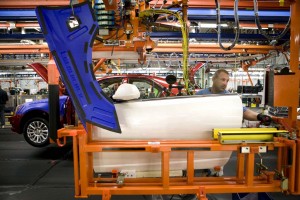
Assembly plants around the world, including this GM facility in Lansing, MI, could soon be idled by the shortage of a key resin.
General Motors and other automakers around the world may be facing production shortages in the coming weeks as a quick solution to the shortage of a key resin seems unlikely.
Alternately known as Nylon-12, or PA-12, the major supplier of the material was heavily damaged in a fire and explosion that killed two workers on March 31. The resin is used in a wide variety of automotive parts and components, from fuel tanks to seat fabric, and was already in short supply even before the incident at German supplier Evonik last month.
More than 200 auto industry representatives gathered in Detroit this week to seek solutions but came away realizing that alternative suppliers don’t have the capacity to cover for the damaged German factory.
“We remain in close contact with supplier associations in Canada, Mexico, and the US, and are reaching out to engage additional companies to help move the process along as quickly and seamlessly as possible,” said a statement from AIAG, the Automotive Industry Action Group, following the summit meeting.
AIAG formed six separate technical groups to seek solutions, ranging from new sources of Nylon-12 to the possibility that alternative resins could be used.
But, “Given the component testing and approval processes employed by” the auto industry, said a statement from consulting firm IHS Automotive, “it is unlikely to be the work of a moment to find or develop a substitutable alternative material.”
General Motors has already warned that some of its suppliers are facing shortages of Nylon-12, TheDetroitBureau.com reported earlier this week.
Other makers have been trying to downplay the potential threat but several major suppliers have issued warnings of their own.
“The shortage is real and immediate. The possibility of production interruptions at some of your facilities in the next few weeks is high,” William Kozyra, chairman of chief executive officer of TI Automotive Ltd., said in a memo to customers.
It remains unclear if and how soon the Evonik plant in Marl, Germany can be back in operation. Complicating matters, that facility provided a precursor chemical used by competitors that also produce Nylon-12.
The situation resembles what happened last year when the earthquake and tsunami in Japan incapacitated a wide range of automotive component manufacturers, including some of the world’s largest producers of vehicle electronic control systems. Last autumn the industry again faced shortages when flooding in Thailand impacted some key industry suppliers there.
But while those disasters had their biggest impact on Japanese manufacturers the shortage of Nylon-12 could short-circuit operations at assembly plants around the world, analysts warn.
